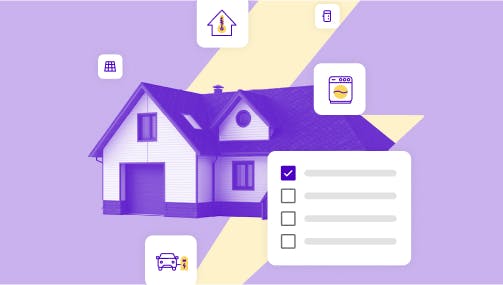FEDERAL ENERGY EFFICIENT HOME IMPROVEMENT CREDIT (25C)
* EXPIRED *
Federal 25C home energy audit tax credits
The deadline to use this incentive has passed. If you completed an energy audit by Dec. 31, 2025, read on for how to apply this credit when you file your taxes in 2026.
View other eligible projects under this tax credit:
Jump to section
Introduction
Introduction
Disclaimer: The information presented here is for educational purposes only. It is not intended to provide specific tax guidance. For questions regarding your individual tax situation, we suggest consulting with your tax advisor.
Tax Credit
Up to $150
Expired Dec. 31, 2025
Which home energy audits qualify?
Home energy audits must have been conducted by a qualified home energy auditor by Dec. 31, 2025. They must include a written report that identifies the most significant improvements and an estimate of cost savings.
The IRS defines a qualified home energy auditor as “an individual who is certified by one of the qualified certification Programs listed on the Department of Energy certification programs for the Energy Efficient Home Improvement Credit (Section 25C) at the time of the audit, or under the supervision of a qualified home energy auditor.”
Your home energy auditor must provide you with a written, signed report that includes the following information:
The home energy auditor’s name and their employer’s EIN or taxpayer identification number
A statement that they have been certified by completing one of the qualifying certification programs and which program they completed
Identification of the improvements that would save the most money in terms of home energy costs
An estimate of how much money each improvement would save
For more information on the home energy audit tax credit, see the IRS Notice 2023-59.
Who qualifies for the 25C home energy audit tax credit?
The 25C tax credit can be used by renters and homeowners who have completed an energy audit for their primary home by Dec. 31, 2025.
Renters and homeowners making upgrades to their primary home
Renters and homeowners can use this tax credit for audits in homes that are already built. Homeowners cannot use this tax credit for secondary homes.
Landlords can never claim this credit for homes they rent out but do not use as a residence themselves.
For more information, see Frequently asked questions about energy efficient home improvements and residential clean energy property credits.
No income requirements
There are no income limitations for the 25C Tax Credit — but like nearly all federal tax credits, you can only use it if you pay federal income taxes.
What is the 25C home energy audit tax credit?
All households who pay federal income taxes are eligible for up to a $150 credit for a home energy audit for their primary residence, as long as that audit was completed by Dec. 31, 2025.
The 25C Energy Efficient Home Improvement Tax Credit provides a tax credit for a home energy audit up to 30% of project costs, capped at $150.
A home audit involves a certified energy auditor coming to your house, calculating how much energy you use, and recommending how you can improve your home to save money on energy costs.
Home energy audits are just one of the home improvements that qualify for the 25C Energy Efficient Home Improvement Credit, which expires on Dec. 31, 2025. Projects like heat pumps, heat pump water heaters, and insulation qualify as well.
| Project Type | How much funding can you receive from 25C for qualifying projects? |
|---|---|
| Project Type:Electrical components | How much funding can you receive from 25C for qualifying projects?: Up to 30 percent, generally capped at $600 per year, for the items listed below:
|
| Project Type:Heat pumps and heat pump water heaters | How much funding can you receive from 25C for qualifying projects?: Up to 30 percent, capped at $2,000 per year for qualified:
|
| Project Type:Weatherization (insulation, air sealing, and ventilation) | How much funding can you receive from 25C for qualifying projects?: Up to 30 percent, capped at the following amounts for each type of project:
All weatherization projects are combined with electrical panel upgrades for a total project cap of $1,200 per year. |
| Project Type:Home energy audit | How much funding can you receive from 25C for qualifying projects?:Up to $150. Home energy audits must be performed by a certified home energy auditor, and include a full home inspection and report to qualify. |
Source: IRS
The 25C Energy Efficient Home Improvement Credit is limited to $2,000 per year for qualifying heat pump water heater installations, and there is a $3,200 yearly cap for all qualifying 25C tax credits combined. All 25C tax credits expire on Dec. 31, 2025.
The good news is that if you already used the 25C credits during a prior year, you can still use them again this year, as long as it’s by the Dec. 31, 2025 deadline.
If you’re interested in an energy audit and would like to claim the 25C tax credit, talk to your energy auditor before starting the project.
Tax credit limitations
The 25C Home Energy Audit tax credit may cover up to 30% of your energy audit costs, capped at $150.
Generally, you must subtract any price adjustments from the cost of the item. This can mean rebates, utility subsidies, financial incentives, and anything else that lowers the price point. This part can get a little tricky, so be sure to check the Frequently asked questions about energy efficient home improvements and residential clean energy property credits for more information.
The 25C tax credit is “non-refundable,” which means that you can't get back more than you pay in federal income taxes.
If 30% of your project’s cost is $100, but you only owe $75 in federal income taxes that year, you would receive a $75 credit.
Remember: After Dec. 31, 2025, any purchases or installations will not be eligible for the 25C tax incentive.
JUMP RIGHT IN
The credit might be over, but the savings still remain
Missed the end-of-year window? No worries, we can still help you find savings.

Select a project to search contractors
Your home's zip code
Project type
Helpful tools

Personal Electrification Planner
Interested in upgrading your home to all-electric appliances and vehicles? Generate a personalized electrification plan based on your particular home, lifestyle, and priorities — all in just a few minutes.

Incentive Calculator
Find out how much you could save with tax credits and rebates for heat pumps, water heaters, electric vehicles, electric stoves, rooftop solar, wiring upgrades, and energy efficiency improvements to your home.

Rewiring America Homes Site
Explore resources to help you electrify everything! Learn about induction stoves, heat pumps, solar panels, EVs, and more.